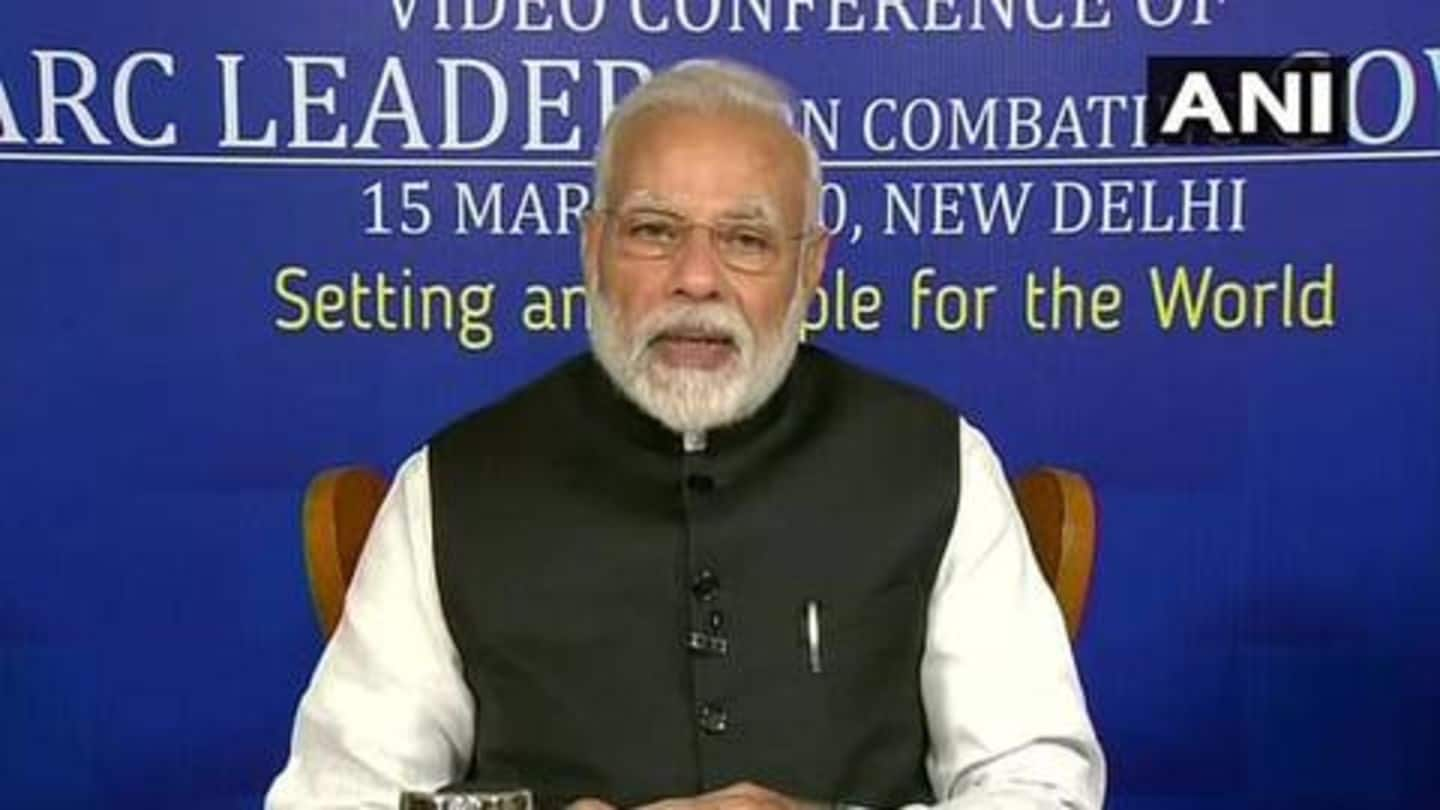
SAARC meet: Modi announces COVID-19 emergency fund; contributes $10mn
What's the story
Prime Minister Narendra Modi commenced the SAARC conference on Sunday at 5 pm. The conference, that was announced on Friday, is aimed at chalking out a plan to combat the novel coronavirus pandemic. Modi said that although the number of cases across SAARC countries do not exceed 150, there is a need to stay vigilant and limit the viral spread. Here are the updates.
Modi's statement
'Prepare, don't panic' our mantra: Modi tells SAARC leadership
Addressing the conference, Modi said that "Prepare, don't panic" has been our mantra. Modi told the world leaders, "We evacuated nearly 1400 Indians from different countries. We also similarly helped some of the citizens of our neighboring countries." The SAARC (South Asian Association for Regional Cooperation) includes India, Pakistan, Afghanistan, Bangladesh, Bhutan, the Maldives, Nepal, and Sri Lanka.
Coronavirus spread
How bad is the coronavirus outbreak in SAARC nations?
Afghanistan President Ashraf Ghani said that the nation has 16 positive coronavirus cases with no deaths. Maldives President Ibrahim Mohamed Solih confirmed 13 cases and no deaths Sri Lanka President Gotabaya Rajapaksa confirmed 11 cases and no deaths Bangladesh Prime Minister Sheikh Hasina confirmed three cases, who have recovered, and no deaths. She reported two new imported cases from Europe.
Coronavirus spread
Nepal and Bhutan fared much better in terms of outbreak
Nepal Prime Minister KP Sharma Oli said the nation has reported one imported case which was later found to be negative for the coronavirus disease (COVID-19) Bhutan Prime Minister M Lotay Tshering addressed the one positive case, a United States tourist, who has since been returned to his country. As per the latest report, Pakistan has 51 confirmed coronavirus cases.
Suggestions
SAARC leaders proposed frequent meetings to aid coordinated response
All SAARC leaders suggested a coordinated response to the coronavirus outbreak. Bangladesh suggested having frequent SAARC health conferences to promote coordinated efforts as the outbreak continues. Nepal, and Pakistan—represented by State Minister of Health Zafar Mirza—also called for more meetings to discuss joint strategy. With tourism taking a hit, many nations addressed the economic blow of the outbreak. India suggested brainstorming long-term economic outcomes.
India's contribution
Modi suggests COVID-19 emergency fund; contributes $10 million
"We do not know what shape the pandemic will take in the coming days," Modi said, highlighting the importance of coming together. He floated the idea of a COVID-19 emergency fund, to which, India will contribute $10 million (approx Rs. 74 crore). He said all nations can make voluntary contributions to the fund, which will be accessible to each SAARC member.
Information
Modi offers rapid response team to SAARC nations
Modi said that India is assembling a rapid response team doctors and specialists, armed with testing kits and other equipment, and offered them to other SAARC nations if required. He also proposed sharing the software of India's Integrated Disease Surveillance Portal for tracing viral spread.
Sharing ideas
Leaders discussed exchanging data, 'collective wisdom'
SAARC members stressed the importance of banding together and sharing "collective wisdom" in these trying times. The nations agreed to share key information, pool resources, and coordinate efforts of health agencies. Pakistan's Mirza said the data exchange must be in real-time. Maldives President also proposed working on a long-term recovery plan. Modi asked for strategies to insulate internal trade from the outbreak.
Highlights
Here are some other highlights from the SAARC meet
Pakistan's Mirza said although the SAARC region has evaded the worst ravages of COVID-19, there is no room for complacency. He also asked India to lift all lockdowns in Jammu and Kashmir. Tshering said that the "enemy" knows no geographic boundaries and smaller economies have been "disproportionately hit." Modi asked SAARC nations to identify nodal experts to continue a follow-up video conference next week.